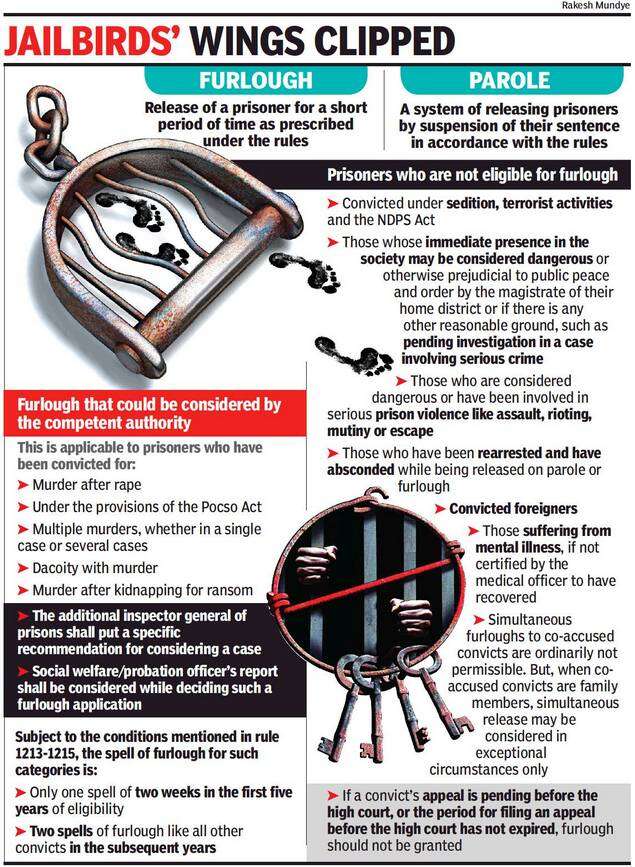Parole in Goa gets tougher as new prison rules tighten conditions

Representative image
PANAJI: With the new prison rules clearly defining eligibility for furlough for different categories of prisoners, securing a temporary release from jail will not be as easy as it used to be before.
Discouraging back-to back paroles, the new rules mandate that there should be a gap of six months between the first and second parole and that the term of each should not exceed 30 days. There should also be a three-month gap between parole and the last availed furlough.

The superintendent of prisons has been designated as the competent authority to grant emergency parole/custody parole to convicts under police protection while the trial court will be the authority to sanction parole applications of undertrials.
Only in exceptional circumstances will parole be extended up to a period of 15 days with the approval of the government, but only once in a block of three years. In no case should parole be extended further, the rules state.
They also stipulate that emergency parole for a period extending up to 48 hours be granted due to the death of a family member, marriage of a family member, serious illness of a family member, or any other emergency circumstances with the approval of the inspector general of prisons (IGP).
Over the past few years, Colvale Central Jail has seen several prisoners abusing parole and furlough facilities by remaining out of the prison for 90-plus days each year. A former official who was posted at Colvale Central jail last year said it was clear that prisoners took full advantage of the system due to loopholes.
“Some considered it their fundamental right while applying for parole. With the new rules taking effect, there is so much clarity on who should be granted parole or furlough,” the official said.
One of the conditions that will need to be considered while approving an application for parole or furlough will be the conduct of the prisoner concerned.
An inmate who has been awarded major punishment for any prison offence should have been uniformly good for two years preceding the date of his application. The conduct of a prisoner who has been awarded minor punishment or no punishment for any prison offence should have to be uniformly good for one year before the date of his application. Also, the convict should not have violated any terms and conditions of the parole or furlough granted previously.
Discouraging back-to back paroles, the new rules mandate that there should be a gap of six months between the first and second parole and that the term of each should not exceed 30 days. There should also be a three-month gap between parole and the last availed furlough.

The superintendent of prisons has been designated as the competent authority to grant emergency parole/custody parole to convicts under police protection while the trial court will be the authority to sanction parole applications of undertrials.
Only in exceptional circumstances will parole be extended up to a period of 15 days with the approval of the government, but only once in a block of three years. In no case should parole be extended further, the rules state.
They also stipulate that emergency parole for a period extending up to 48 hours be granted due to the death of a family member, marriage of a family member, serious illness of a family member, or any other emergency circumstances with the approval of the inspector general of prisons (IGP).
Over the past few years, Colvale Central Jail has seen several prisoners abusing parole and furlough facilities by remaining out of the prison for 90-plus days each year. A former official who was posted at Colvale Central jail last year said it was clear that prisoners took full advantage of the system due to loopholes.
“Some considered it their fundamental right while applying for parole. With the new rules taking effect, there is so much clarity on who should be granted parole or furlough,” the official said.
One of the conditions that will need to be considered while approving an application for parole or furlough will be the conduct of the prisoner concerned.
An inmate who has been awarded major punishment for any prison offence should have been uniformly good for two years preceding the date of his application. The conduct of a prisoner who has been awarded minor punishment or no punishment for any prison offence should have to be uniformly good for one year before the date of his application. Also, the convict should not have violated any terms and conditions of the parole or furlough granted previously.
FacebookTwitterLinkedinEMail
Start a Conversation
end of article
Quick Links
Delhi Air PollutionDelhi TemperatureChennai WeatherBangalore TemperatureCovid vaccination centres in DelhiCoronavirus in DelhiRTPCR test in GurgaonHyderabad RainPollution level in BangaloreDelhi SmogDelhi TemperatureNoida AQIGurgaon AQI todayFire in MumbaiMumbai RainsCovid 19 RT PCR Test in NoidaDelhi AQI todaySrinagar encounter

